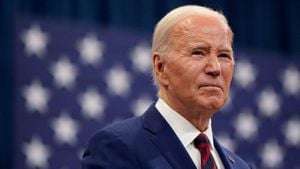Seoul is buzzing with tension as President Yoon Suk Yeol finds himself embroiled in immense political turmoil following his controversial declaration of martial law. This unexpected move, which erupted on December 3, 2024, aimed to quash the increasingly vocal opposition from the Democratic Party, whom he accused of paralyzing the government. Yet, instead of restoring control, it ignited widespread backlash, putting Yoon's presidency on shaky ground.
Yoon's decree saw military troops deployed to the National Assembly, ostensibly to maintain order amid what he described as threats to the state. But instead of stifling dissent, the actions fueled protests across the nation, with thousands gathering daily to demand his resignation. The panic and disbelief among the citizens stemmed from the sudden clampdown on political activities and media censorship, creating echoes of previous authoritarian measures fewer South Koreans had hoped to leave behind.
Defending his actions, Yoon promised to "fight to the end" against what he framed as anti-state forces, exacerbated the division within the nation. During his national address, he repeatedly insisted his martial law declaration was not insurrection but rather necessary for protecting the constitutional order. He characterized the leaders of the Democratic Party as monsters seeking to undermine South Korean democracy.
"The opposition party is doing a crazy sword dance saying the declaration of martial law is a crime of insurrection," Yoon asserted, questioning the accusations against him and labeling them as unfounded. Throughout the tumultuous past week, he has tried to rally public support, claiming he acted out of necessity due to mounting political scandals threatening to derail the government.
But the opposition has been undeterred, swiftly organizing to pursue impeachment proceedings against Yoon. Just days after his martial law decree was lifted, the Democratic Party prepared to present another motion for impeachment this Saturday, rekindling the heated political battle. Yoon's People Power Party, initially hesitant about impeachment, is now caught between dissenting opinions, with party chief Han Dong-hoon hinting at breaking ranks if Yoon continues to resist the calls for resignation.
"We tried to find a way other than impeachment, but the other road has failed," Han stated decisively. Members of the once-loyal ruling party are increasingly vocal, urging their fellows to act according to their beliefs and the sentiments of constituents.
With the national mood turning against him, recent polling data reveals nearly 80% of South Koreans favor impeaching Yoon. The country seems to echo calls for accountability, with many citizens demanding immediate investigations and consequences for the president’s actions. Almost 70% of respondents suggested he should not only be investigated but potentially arrested.
Yoon's predicament has thrown the political stability of South Korea—the world's 10th largest economy—into the spotlight as foreign nations watch anxiously. His inability to secure support within his party following the martial law fallout could signal significant shifts within the South Korean political arena, including potentially fast-tracking early elections.
Following backlash, Yoon's leadership has faced numerous resignations and suspensions of high-ranking officials, suffocatively illustrating the atmosphere of distrust developing among his closest allies. With protests swelling, public opinion has crystallized against him.
Adding to the complications surrounding his presidency, police investigations are delving deep, with probes underway to assess the legality of Yoon's actions during the martial law declaration. Recently, the authorities have conducted raids on military headquarters, seeking accountability from military leaders involved. Meanwhile, former defense minister Kim Yong-hyun, detained after the events, attempted self-harm, reflecting the heavy psychological toll this political crisis has wrought.
Throughout this ordeal, the opposition has strategically exploited Yoon’s missteps, painting him as unable to govern effectively. They contend the military's aggressive response during the assembly highlights significant overreach and misuse of power, fueling their narrative of irresponsibility. With the next impeachment vote on the horizon, Yoon's fate appears increasingly precarious.
Yoon's declaration may have seemed justified to him, but for many South Koreans, it felt like a desperate grasp for power. Without substantial support from the People Power Party—and with civil unrest reaching significant levels—he now stands on the precipice of political disaster. The nation waits with bated breath to see if Yoon's presidency can withstand this storm or if it will crumble under the pressure of its political realities.
How this saga will conclude remains uncertain, but one thing is clear: South Korea's future teeters on the edge, shaped by the decisions made during these tumultuous days. The people’s trust is at stake, and as they clamor for accountability, Yoon's actions will reverberate long after the dust settles.
The political drama within South Korea is not just about one man's ambition; it’s about the delicate dance of democracy and the trust between the government and its people. Will Yoon manage to stay afloat, or will his reign become merely a cautionary tale of overreach and unrest?



